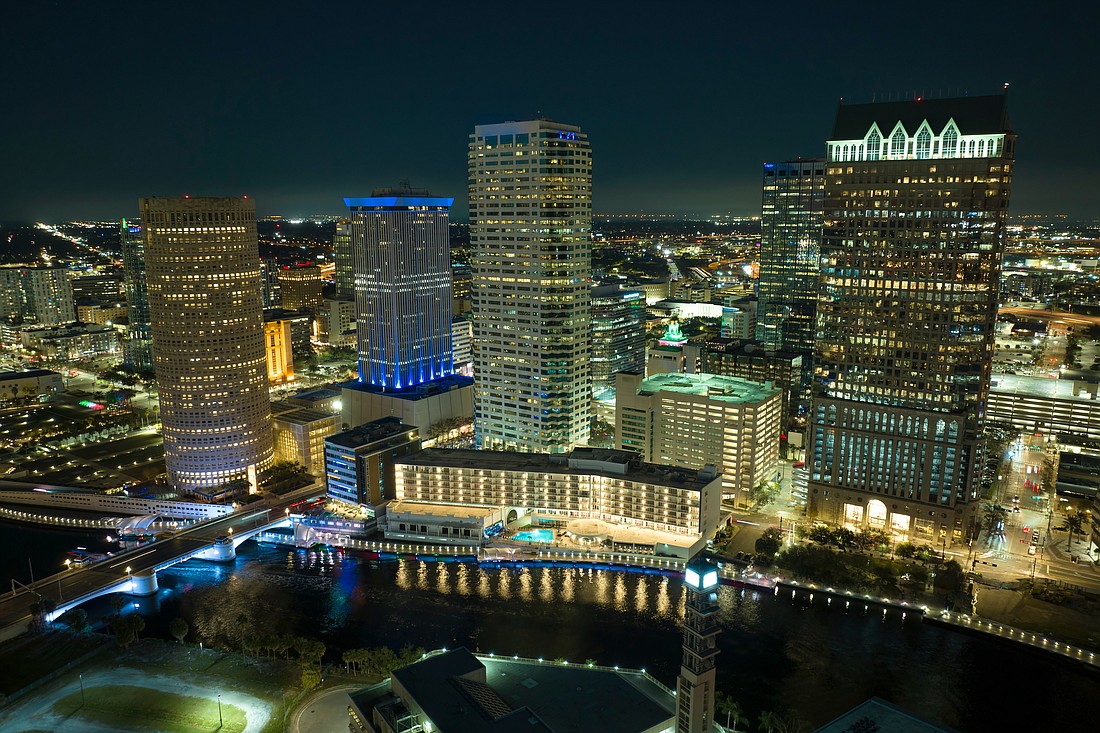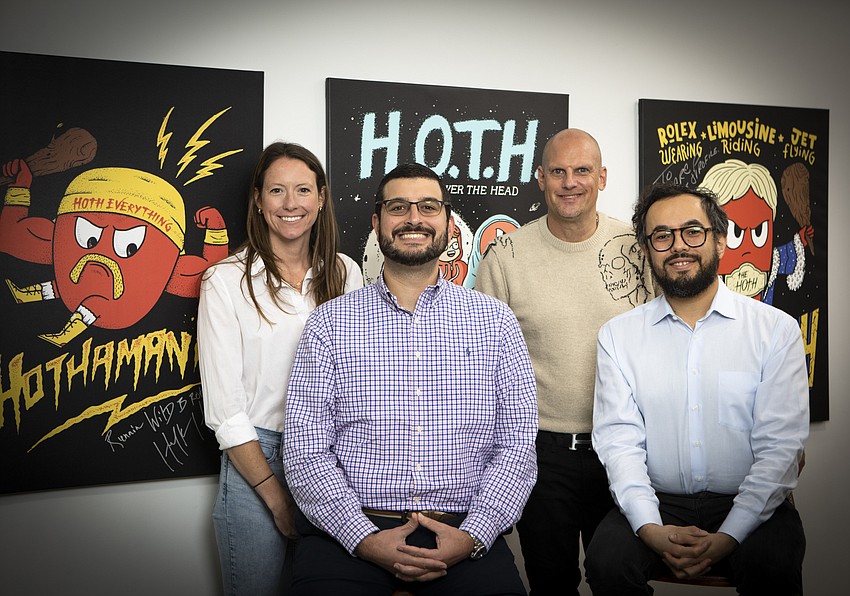- April 16, 2025
-
-
Loading

Loading

California is in a small crisis, and that could be an opportunity for Tampa Bay.
California's main economic jewel is not its vast farms, where mass volumes of fresh greens and almonds are grown. It's not Hollywood, because shooting movies there is sometimes so expensive, filmmakers leave for Canada, New York or even New Orleans.
The Golden State's main jewel is Silicon Valley and San Francisco, once primarily a source of semiconductors, now a more diverse source of both silicon and virtual gold. Consider all the digital and social media companies that exist there: Meta (Facebook and Instagram); Apple; Alphabet (Google); Netflix; X (formerly Twitter); and more. And those are just the big ones. A 2021 report by Joint Venture estimated 500,000 tech workers live in Silicon Valley.
But that's changing, ever so slowly, but ever so consistently. The California crisis — problems that vex San Francisco and Silicon Valley — is drug abuse, homelessness, crime, high taxes, high rent, high costs and California's growing register of regulation. It's driving many companies and talented California residents to Texas and Florida, among other tech hubs.
Recently, there was Sacramento-based Lynx Automation, which develops technology for automated property management for hotels, motels, vacation and long-term rental properties, coming to the Tampa Bay area. Lynx was just one of several companies coming from California to Tampa Bay, citing costs and regulations.
Making the decision easier is not everyone has to live in Florida: Remote work has made it possible for programmers and code writers to live anywhere.
But can Tampa Bay take advantage of the exodus and turn the region into a larger hub of high tech? After all, the Tampa Bay region is about the size of the five-or-six-county-sized Silicon Valley, with plenty of room from Pasco to Sarasota. (And the state-designated Florida High Tech Corridor is even bigger: It's basically all of Central Florida.)
The job openings in tech, as well as the regional offices of the big players already being in Tampa Bay, indicate potential, potential seen by analysts and media. In 2021, for example, Tampa was named by Forbes the No. 1 emerging tech city in the United States.
It's why Tampa Bay officials say the tech exodus already has begun, while some organic growth of tech is also to be seen.
One sign is tech companies relocating portions of their business in Tampa Bay, if not the entire C-suite, says Sylvia Wilson Thomas, University of South Florida's vice president for research and innovation and the CEO of the USF Research Foundation.
Wilson Thomas says tech companies see the culture and the "fire in the belly" for success in the region's workers. They also take note of the claim that the city of Tampa alone has 25% of Florida's tech jobs.
But is it enough to take on Silicon Valley and siphon some of their 500,000 tech jobs? Just 5 to 10% of those jobs over five to 10 years, siphoned or otherwise, would turn Florida into a serious competitor. And, Tampa Bay tech officials say, much of the growth doesn't have to be from uprooted companies, but from local companies, local entrepreneurs and the occasional "unicorn," a privately-held company worth more than $1 billion. (Think locally-born cybersecurity giants like Tampa-based ReliaQuest and Clearwater-based KnowBe4.)
Tampa Bay is hardly the only region with the goal of being a new "Silicon Valley." Austin, Texas, has laid claim to a large number of tech jobs, for one. Boston; Washington, D.C.; New York; and Miami also have notable tech sectors.
But Austin, much like Miami, has growing pains.
Marc Pickren of Austin sees a great potential in Tampa Bay. He is president of Next Net Media of St. Petersburg, a global digital marketing company with 250 people and operations from Australia through the United States to the United Kingdom.
Next Net works on search optimization, link sharing and content production, claiming to be one of the world's biggest content producers. About 50 people work at the company's St. Pete headquarters, although they do not have to come to the office every single day, Pickren says.

Like many of his high-tech workers, Pickren does not live near the headquarters. Having joined the company in July, Pickren remains in Austin. But he plans to move to St. Pete soon, expressing an excitement about the workforce, the sunny environment — and even the roads.
"The infrastructure (in St. Pete) is first rate," says Pickren. "You really can't beat the quality of life here."
But is St. Pete and Tampa really as attractive as Austin? Texas, like Florida, has no state income tax. In Austin, undeniably a business hub, talent is often piped through the largest university in the Lone Star State, the University of Texas at Austin.
Yet Pickren says Austin now has an affordability problem, which is hardest on young people. (Of course, many in Tampa Bay say Tampa Bay has a similar affordability problem, only with different salary to cost of living data.) Tampa Bay also has a similar research university with USF, which Pickren says produces quality graduates, including some from the 6,000-strong business students on its three campuses.
"We had a lot of success hiring people out of college," says Pickren. "We found the work ethic of the folks we were able to find here is next level."
The type of new Tampa Bay employees is also much different than candidates in San Francisco, New York, Austin — "even Miami," he says.
"Their lack of extensive entitlement, their hard-working nature," says Pickren. "It's just sort of the antithesis of the San Franciscos, the New Yorks, even the Miamis."
Another tangible, and recent, win for the Tampa Bay tech scene comes from star Wall Street investor Cathie Wood, and her $60 billion fund, ARK Invest. Wood decided she had enough of New York, and a in late 2021, she settled in St. Petersburg, bringing ARK Invest with her. She immediately got involved in the tech and business community in Tampa Bay, investing $2 million in the Tampa Bay Innovation Center, which named the St. Pete building after her.
Capturing New York talent is old hat for Florida. The previous and current governors of Florida, Rick Scott and Ron DeSantis, often recruit CEOs and their companies in New York. Scott once said he targets the CEOs because sooner or later, they may bring their entire headquarters down from New York, or Stamford, Connecticut, etc.
After the COVID-19 pandemic and strict New York lockdowns, the CEOs needed less convincing. They began to move to Florida. Recently, even Jeff Bezos announced he was headed to the Sunshine State to live, ostensibly to shield his vast wealth from West Coast taxes. But Amazon, for now, will remain in Seattle.
Wood's departure in 2021 was different. While she was a New Yorker, not a West Coaster, her move was seen throughout the nation as a thumbs-up to Tampa Bay as a place to do both finance and tech.
But why did she and others come here? Wood, in late 2021 press release from the St. Pete Area EDC, said that "we believe the Tampa Bay region's talent, innovative spirit and quality of life will accelerate our growth initiatives. ARK is not a traditional Wall Street asset management firm, and we are looking forward to breaking the mold further by relocating to St. Petersburg, a city investing in technology, science and innovation."
Next Net's CEO agrees with Wood.
"Tampa Bay's been up-and-coming for years now, but it's only become more obvious as we've moved through the pandemic," says Marc Hardgrove, Next Net CEO. "The community has done a ton to invest in the emergence of local tech companies and startups. Couple that with the surrounding colleges with local talent, great weather and low state taxes, and you've got a spot that's prime for the tech scene."
Wilson Thomas, meanwhile, likes to use the term "ecosystem," when describing the local tech scene. But she's not referring to the Florida wilds. She is instead referring to the region's resources and partnerships. Those partnerships include a relationship between USF and MacDill Air Force Base in Tampa, a partnership she says is unique even among tech hubs like San Francisco and Austin.
Wilson Thomas says Tampa Bay could pull in 4,000 net new tech jobs by 2027. And she notes Tampa Bay "already" is a tech hub. The question is how much it will grow.
"Tampa Bay is leading the nation on several fronts," says Wilson Thomas. "We continue to grow. We continue to be looked at ... Opportunity is presenting itself for those start-up companies."
Of course, not all opportunities are grabbed. In October, the Biden Administration gave the only "tech hub" grant to Miami-Dade for its "South Florida Climate Resilience Tech Hub," which will monitor global warming. The grants are worth at least $40 million, and Tampa Bay wanted it.
Wilson Thomas says Tampa Bay plans to reapply.
While Wilson Thomas is on the academic side, another organization, Embarc Collective, is a leader on the entrepreneurial side of fostering the Tampa Bay tech scene.
Lakshmi Shenoy founding CEO of Embarc, which assists 125 tech startups across Florida, says she sees the possibilities of a bigger tech-oriented Tampa Bay, which has the things she believes a growing tech hub must have: talent, customers and capital. "Along all those fronts, we are definitely seeing that potential," says Shenoy.
But there is no "silver bullet" to growth or tech success, Shenoy says, noting even tech hubs like Silicon Valley and Austin have to work to "retain their authority" as tech hubs.
After the pandemic, it hasn't been as easy for the big kids on the tech block. Workers started to look at quality of life a bit more, and Shenoy says Tampa Bay is "incredibly livable." The region must "lean in" to its advantages, she adds.
But despite the challenges, Hardgrove, with Next Net, believes the region's "cool factor" will set it apart.
"While the cost of living has gone up recently, it's still reasonable for the local attractions, proximity to beaches, and space you get for the price," Hardgrove says in an email. "It's been a well-kept secret for a while, but generally, people love the quality of life, the food and music scene, and the ability to explore more outdoor hobbies year-round ... There's a ton to do."